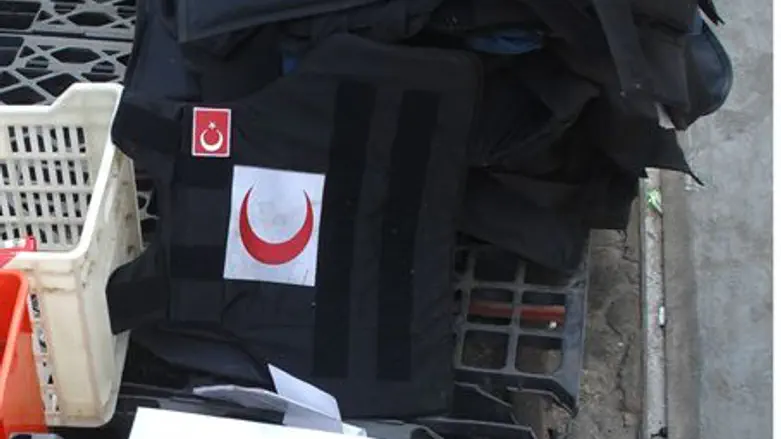
Reporters at Tuesday's State Department briefing on the U.S. involvement in Sunday night's Muslim militant ambush of Israeli Naval commandos on flotilla vessels heading to Gaza appeared to be seeking anything but the objective facts in the incident.
Among the items found on the Turkish vessel, the Mavi Marmara, were bulletproof vests, military-grade night vision equipment, a rifle scope, an assortment of knives, electric saws, metal rods and clubs. The violent confrontation left nine militants dead and seven IDF soldiers wounded, including two originally in serious condition but now changed to moderate. A total of 380 Turkish nationals, who were passengers in the six-vessel flotilla -- including many militants on the Mavi Marmara -- are expected to be sent back to Turkey by Thursday. More than a hundred Arabs have already been deported to Jordan, from where they traveled to their ports of origin.
State Department spokesman Phillip J. Crowley faced a barrage of questions Tuesday, many of them pointed and some of them almost outright hostile, according to a transcript of the briefing. The questions and behavior of the journalists, most of them seasoned reporters from respected media outlets, makes it clear why coverage around the globe may not be fair, accurate or objective.
From the outset, the spokesman reiterated in response to a question a statement made earlier in the day by U.S. Secretary of State Hillary Clinton that the Obama administration supports the U.N. Security Council's call for a “prompt, impartial, credible and transparent investigation” of the incident.
He added that Israel is “in the best position to conduct an investigation of what transpired” – a response that prompted one journalist to comment derisively, “The fox [is] watching the hen house here.”
Crowley responded, “There were Israeli forces that carried out this action, and we think that that means that they're in the best position to investigate what instructions were given to those forces, how they viewed the situation as they approached the flotilla, and what transpired on board that ship." But Crowley's further explanation, “We support an Israeli investigation, but we're open to different ways of ensuring a credible investigation, including international participation,” was ignored.
The spokesman's responses appeared to please no one, and the briefing rapidly descended into a near free-for-all.
The same journalist charged, “A foreign military boarded a ship in international waters, assaulted its passengers, handcuffed and beat some of those passengers, many of them humanitarian activists, and you're saying you're not prepared to send U.S. investigators.”
The spokesman refused to be baited, however, responding mildly that “you're making some presumptions... in your question. You characterized what happened on the ship. We are still trying to ascertain precisely what happened on that ship.”
Further demands by the journalist to know whether the American government would send the FBI were deflected by the spokesman, who responded that he was “not prepared to say what role the United States would have at this point.”
The next question dealt with the “essential” medical equipment the flotilla was allegedly bringing to Gaza. “These ships had aid, medical equipment including wheelchairs, building equipment,” noted a reporter. “How essential is it right now that this equipment get to the Palestinians?” he asked. “How important is it that these materials are now sort of confiscated and not within the hands of those who desperately need it? Is this useful right now?”
But rather than refer the journalists to the lists of the thousands of tons of humanitarian aid – including medical equipment and other supplies – delivered weekly through the Israeli land crossings to Gaza, Crowley sidestepped the question.
“I can't say right now what the status of the material that was on the ship," he said. "Certainly, again in the [U.N.] presidential statement, there was an encouragement, which we absolutely support, that that material be provided to the people of Gaza,” he commented. “We have pressed the Israelis to expand the amount of humanitarian assistance to the people of Gaza, and we will continue to work with the Israelis every day to try to make that happen,” he added.
Two more ships are currently heading to Gaza apparently in hopes of repeating Monday's scenario – a point which the reporters raised as a concern regarding Israel's plans for stopping the vessels.
“Is the United States offering any words of caution to Israel that if you're going to try to stop it this time, do it differently,” asked one reporter.
On this point as well, Crowley took a side-step, saying that Secretary Clinton “did express that for the United States, for Israel, for other countries, we should be extremely cautious in both what we say and what we do in coming days, in light of what's transpired... I don't think anyone wants to see a repeat of what happened [Monday].”
As the briefing drew to a close, the spokesman stated for the record that “We certainly understand that Israel has a right to self-defense. Given the situation in Gaza, it has been subject to rocket attacks in the past. There is a state of hostility between Israel and Hamas... That said, there is also a clear humanitarian need to provide material to the people of Gaza to help them subsist and rebuild, and we recognize that as well. As the Secretary and others have said, the situation in Gaza is unsustainable. We want to see how we can provide greater assistance to the people of Gaza but clearly, while protecting Israel's legitimate right of self-defense.
“Israel has a right to be concerned about the nature of materials that is moving into Gaza,” he added. “At the same time, we've long called for an expansion of humanitarian goods to the people of Gaza to help improve their situation on the ground.”